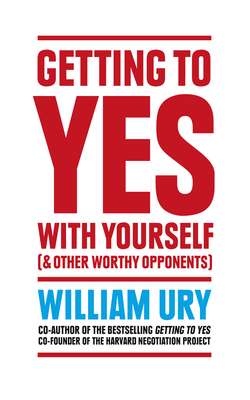Читать книгу Getting to Yes with Yourself: And Other Worthy Opponents - William Ury - Страница 15
From Self-Judgment to Self-Understanding
ОглавлениеAs straightforward and natural as it sounds, it is often not that easy to put yourself in your own shoes—to see yourself from the balcony, to listen to yourself with empathy, and to uncover your underlying needs. The journey from self-judgment to self-understanding takes hard and continual work.
To return to the earlier example I gave of my client Abilio Diniz, even once he had uncovered his deepest need—freedom—he encountered many internal difficulties in his way. Shortly after our conversation, Abilio gave a major and lengthy magazine interview in which he emphasized that he was moving beyond the battle with his former business partner in order to live his life. In the introduction to the article, however, the interviewer noted that, in the course of the conversation, Abilio mentioned his adversary by his full name thirty-eight times, hardly an indication of moving ahead. The following week, Abilio was in a board meeting of his organization and, despite his expressed intention to keep his cool, felt provoked and repeatedly called his opponents cowards. However much he tried, he found it hard to stay on the balcony.
When I next spoke with Abilio, who was becoming a friend in the process of our work together, he told me: “The truth is that I am still furious. What can I do? I don’t know what I really want. Sometimes it is to finish the dispute and sometimes it is to carry on the fight. I may have no choice anyway but to continue to fight. Maybe I should just enjoy it.”
The process of getting to yes with yourself can often be difficult just as it was for Abilio. In the problematic situations we face at work, at home, or in the larger world, it is common to be torn and undecided and it is easy to continue to react. That is why the patient and courageous practice of putting yourself in your shoes is so vital. Abilio persisted. He had long intimate talks about his dilemma with his wife and family. He went every week to see a therapist to uncover his darkest feelings. He talked with me. He wrestled with his temper; and with dedication and discipline, he learned to spend more time on the balcony. By understanding and accepting himself just as he was, he became his own ally rather than his own worst opponent.
However challenging it was for Abilio to engage in this psychological work of figuring out what he really wanted and then reaching an inner agreement with himself, in the end the rewards were immensely greater: he received his life back. Even before we approached his opponent at the negotiation table, Abilio took concrete actions to pursue his freedom. He became chair of the board of another major company, he found a new office outside of the company headquarters, he went on a prolonged holiday with his family, and he began to explore a new business deal. In other words, he said yes to his needs. This yes to himself opened up the possibility of approaching his adversary for a genuine negotiation, one in which neither side would lose. And that made all the difference, as we’ll see later in the book.
As this story suggests, putting yourself in your shoes helps you become your friend rather than your opponent when it comes to negotiating with others. It helps you not only to understand yourself, but to accept yourself just as you are. If self-judgment is a no to self, self-acceptance is a yes to self, perhaps the greatest gift we can give ourselves. Some might worry that accepting themselves as they are will diminish the motivation to make positive changes, but I have found that the exact opposite is usually true. Acceptance can create the sense of safety within which we can more easily face a problem and work on it. As Carl Rogers, one of the founders of humanistic psychology, once noted: “The curious paradox is that when I accept myself as I am, then I change.”
Now that you have put yourself in your shoes and uncovered your needs, the natural question to ask is: Where can you find the power to meet those needs? That is the next challenge in getting to yes with yourself.
